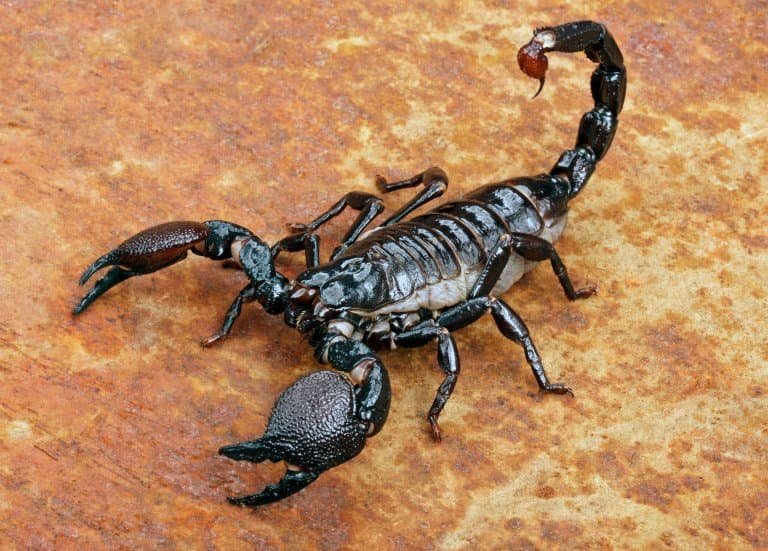
Imagine sitting around a campfire, sharing ghost stories, and someone mentions the Emperor Scorpion. You might feel a shiver down your spine, thinking about its intimidating pincers and long tail. But the truth is often less scary than the stories we hear. Let’s delve into the facts and explore whether the Emperor Scorpion can truly be a threat to humans or if it’s just another misunderstood creature in the animal kingdom.
Understanding the Emperor Scorpion
The Emperor Scorpion, or *Pandinus imperator*, is one of the largest scorpions in the world, often reaching lengths of up to 8 inches. Their glossy black exoskeleton and large pincers make them quite the sight to behold. Native to the rainforests of West Africa, these scorpions thrive in humid environments and are often found hiding under rocks or in burrows during the day.
Despite their fearsome appearance, Emperor Scorpions are generally more curious than aggressive. They primarily feed on insects and other small creatures, using their powerful pincers to catch prey. Interestingly, their venom is not as deadly to humans as you might think. This brings us to a critical point: understanding what makes them unique and how they interact with their environment.
While they can deliver a painful sting, most encounters with humans end without any serious harm. So where does the myth of their deadly nature come from? The truth is, people often exaggerate the dangers of creatures they don’t understand.
The Myths Around Scorpion Venom
You might be wondering why there’s so much fear surrounding the venom of scorpions. In reality, most scorpions possess venom that is relatively mild. The Emperor Scorpion’s venom falls into this category. It may give you a sharp sting—think of it like a wasp sting—but it’s rarely life-threatening.
Here’s the thing: venom is primarily a tool for hunting. Scorpions use it to subdue their prey rather than for self-defense against larger animals like humans. In fact, the venom of the Emperor Scorpion is often used in traditional medicine to treat various ailments. This is a reminder that even creatures that seem dangerous can have beneficial qualities.
When we hear about someone being stung by an Emperor Scorpion, it’s essential to consider the context. Most incidents occur when the scorpion is provoked or handled improperly. If you’re not planning to handle one, you’re unlikely to encounter any issues.
Can They Kill a Human? The Facts
Let’s address the heart of the matter: Can the Emperor Scorpion kill a human? In short, no. While their sting can be quite painful, it’s not lethal. Healthy adults typically experience only localized pain, swelling, and some discomfort.
In rare cases, allergic reactions can occur, similar to those from bees or wasps. For people with compromised immune systems or allergies, any venom can be dangerous. However, these cases are exceptional. The vast majority of people will recover quickly from a sting without any lasting effects.
For those curious about statistics, there have been very few reported fatalities caused by Emperor Scorpion stings. This further underscores the idea that, while they may look intimidating, they do not pose a serious threat to human life.
Signs and Symptoms of a Scorpion Sting
If you or someone you know gets stung by an Emperor Scorpion, it’s important to recognize the symptoms. Here’s a breakdown of what to expect:
- Pain: The sting will likely feel sharp at first, similar to a bee sting. It can radiate, leading to discomfort.
- Swelling: Local swelling around the sting site may occur, which is normal for most insect stings.
- Redness: The area may flush and become red due to the body’s inflammatory response.
- Other Symptoms: In some cases, mild nausea or sweating can occur. If you experience these, it could indicate an allergic reaction.
For most people, home care is effective. Applying a cold pack to the sting site and taking an over-the-counter pain reliever can help ease discomfort. If symptoms worsen or do not improve, seeking medical attention is a good idea.
Caring for Emperor Scorpions as Pets
If you’re contemplating bringing an Emperor Scorpion into your home as a pet, you’re not alone. Many people find these creatures fascinating. They can make intriguing pets with the right care. Here are some tips to ensure their well-being:
1. Habitat: Create an environment that mimics their natural habitat. This means a humid terrarium with plenty of hiding spots.
2. Temperature and Humidity: Keep the enclosure warm—around 75-85°F—and maintain humidity levels of 60-80%.
3. Feeding: Feed them a diet of crickets and other small insects. They are nocturnal hunters, so don’t be surprised if they prefer a night-time snack.
4. Handling: If you choose to handle your scorpion, be cautious. Use a pair of tongs and never pick them up with your bare hands unless you’re very experienced.
By understanding their needs, you can enjoy the company of these unique arachnids without fear.
In wrapping up our exploration of the Emperor Scorpion, it’s clear that fear often stems from misunderstanding. While their appearance can be intimidating, the reality is that they are not the deadly creatures many believe them to be. Most people will never face any serious danger from an Emperor Scorpion.
So, the next time someone spins a tale about these fascinating creatures, you’ll know the truth. The Emperor Scorpion, with its impressive size and unique behavior, is more of a misunderstood marvel of nature than a deadly threat. Let’s appreciate these arachnids for what they are—intriguing additions to our world rather than fearsome foes.

